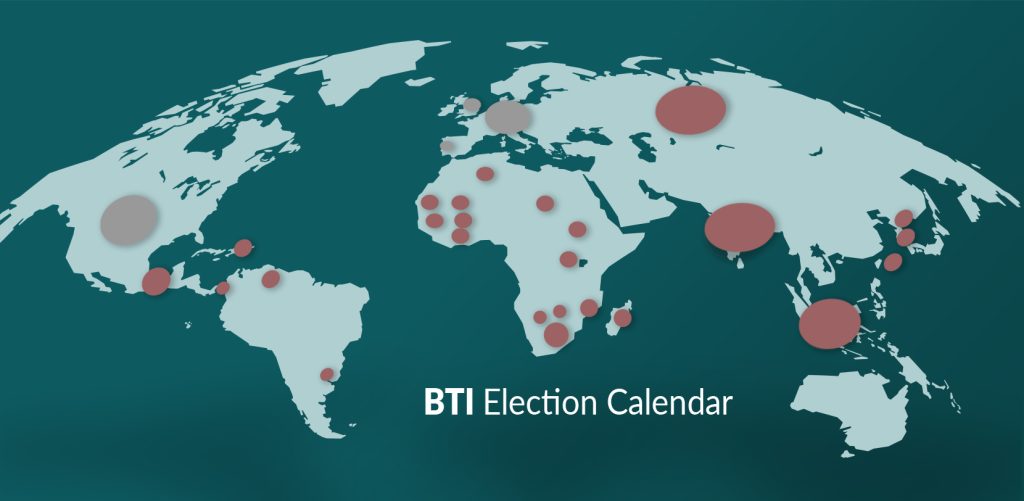Democracy in Action: The Election Super Year 2024
Featuring over 70 elections and 4.2 billion voters, 2024 represents a landmark year in political participation. With half of this election super year over, it is time to take stock of past results, look ahead for what is still to come, and introduce a tool to keep track of the 46 global elections from Algeria to Venezuela: the BTI Election Calendar.
From Sheinbaum’s landslide victory in Mexico with the governing party Morena to Russia’s, Azerbaijan’s, and Bangladesh’s sham elections leaving little room for democratic participation and fair competition, the global election year 2024 so far saw many predictable outcomes.
Yet, there were surprises too. Both long-term ruling parties in India and South Africa experienced ruptures in their monopolist manifestations of power while Panama conducted free and fair elections – however, not without doubts for its democratic consolidation. In Europe, the June election results gave the political spectrum of the parliament a shove to the right – with the hard-right making most gains overall, particularly in France and Germany.
Apart from the inescapable US elections in November, a look at the remainder of the year promises a variety of elections in diverse regions taking place. Some already seem called for and predictable, while others could surprise with unforeseen outcomes. This text analyses Rwanda, Botswana and Georgia in particular.
In the rearview: What have we seen so far?
In South Africa, the African National Congress (ANC) lost its absolute majority in parliament for the first time in 30 years – leaving it in search for a substantial alliance to govern. In India, Narendra Modi and his Hindu-nationalist agenda with the Bharatiya Janata Party (BJP) failed to gain the absolute majority in the Lok-Sabha, India’s lower house. Now Modi, much like Cyril Ramaphosa in South Africa, faces unknown political terrain. The world will eagerly observe how their administrations operate under the new circumstances.
The elections India, South Africa, and Panama clearly prove that political participation is vibrant, vital, and most importantly, means something to people. However, whereas in India and South Africa the long-term rule by one party creates a wobbly platform for democratic consolidation, Panama is an example where a clientelist political environment was cause for concern this year.
This issue lames Panama’s transformation process even though factors such as fair and equal media access for candidates indicate free and fair elections. But cumbersome registration procedures for independent candidates, inconsistent applications, and changes to electoral regulations are troublesome. Still, this year’s presidential race involving eight different candidates is an example for democratic political participation. Ultimately, José Raúl Mulino was able to win the election with over 35% of the voter-turnout, securing the presidency for his Realizando Metas party.
Is an election all it takes to have a democracy?
One election is not mirrored by another. Azerbaijan held its election on February 7th. A country where elections have been entirely unfree for over 15 years, this one proved no different. Ilham Aliyev, in power since 2003, won a fifth term in office, officially drawing more than 92% of the vote. To further consolidate his power, Aliyev had the election called two years early after taking control of the Karabakh region from Armenia. For 15 years he has systematically filled election commissions with regime loyalists, eliminated presidential term limits and exercises control over the media. Unsurprisingly, this has led to diminishing public interest in the election process and even the boycott of this year’s election by the opposition.
Another example for a country where the quality of elections has been in downward spiral for a decade is Bangladesh. A power-play between the two biggest parties Awami League and the Bangladesh Nationalist Party (BNP) put the country in a deadlock of regular societal uprising caused by dysfunctional checks and balances.
The elections on January 7th returned Sheikh Hasina of the Awami League to a fourth consecutive term as Prime Minister against the backdrop of concerns about electronic voting machines, voting integrity and hereby the impartiality of the election commission. What ensued were violent protests resulting in the arrest of tens of thousands of activists and an eventual boycott of the election by the opposition BNP.
An important observation here is that even in autocratic states like Bangladesh or Azerbaijan, national elections are held. However, conducting an election does not mean that voters actually have a choice.
A glance ahead: What is still to come?
Reflecting on the election super year so far, the conclusions could be two-fold. One, democratic participation has seen a triumph in the cases of India, Panama, and South Africa. Second, there should be growing concern as in many countries voters’ and opposition rights are diminished by the implementation of sham elections.
The BTI Election Calendar not only summarises what has happened but provides an overview of what lies ahead for this year. Many of the 4.2 billion people still have important decisions to make for the governance of their respective countries.
A glance at the African continent tells us that nine countries have scheduled and confirmed national elections in the second half of 2024. Among them Rwanda (July 15) and Botswana (October 31). While Rwanda’s government under Paul Kagame and the Rwandan Patriotic Front (RFP) shows little to no tolerance to domestic critics and dissidents, its foreign appearance promises efficiency and progress. However, the BTI 2024 argues that Rwanda’s fragile political foundation and autocratic rule lead to increased cronyism, social instability, and the death of public space.
The resistance to change is not just something we observe in autocracies. A temptation to tilt the electoral playing in favour of the incumbent and risk impairing the fairness of elections can also be observed in democracies. Botswana’s democratic foundation is impaired by a corroding bureaucracy and a system that weakens the parliament – impeding it to hold the executive branch accountable. These are significant obstacles to flexibility and adaptability. The positive image Botswana enjoys internationally, however, is not just hearsay. Under president Mokgweetsi Masisi, whose Botswana Democratic Party (BDP) has held a majority of the seats since Botswana’s independence in 1965, commitment to free elections and media freedom has been substantialised. It remains to be seen if the elections in 2024 prove to transform Botswana’s political landscape into a multi-faceted political environment or if the BDP maintains its position of power.
Considering the recent backdrop of media freedom and the freedom of expression, Georgian voters will be heading to the polls for a fundamental election on October 26. While protests have filled the streets of Tbilisi in early summer, the Georgian Dream Party (GD) continued to manifest its position of power by pushing through a “foreign agents” law mirroring Russian legislation that is threatening to quash independent civil society and media.
The government seems to be consolidating its power at the expense of separating itself from its citizens and increasing political polarization. Amid the growing nationalist tendencies and proximity to Russia displayed by the government, protesters show strong support for a pro-European agenda and are concerned with the fusion of executive and judicative branches in their country. Voters will decide over the future course of the country while many of them question the integrity of the elections.
Conclusion
In a multilateral world, national elections have global consequences. The examples in this article show that apart from the omnipresent US elections where much of the global spotlight shines on till November, other states and regions are also holding elections impacting the fragile global construct of governance. Seeing how the election super year has evolved and what’s to come, it is glaring that political participation is extremely valuable.
Conducting free and fair elections, however, is only one piece of the pie that is democracy. In democratic processes, different political, economic and governance indicators drive transformation forward. The BTI Election Calendar not only serves as an overview on which states and regions to keep an eye on in this year, but it functions as an entry point to the BTI 2024, which offers qualitative data on where democracy is highly valued and where it is under pressure.

